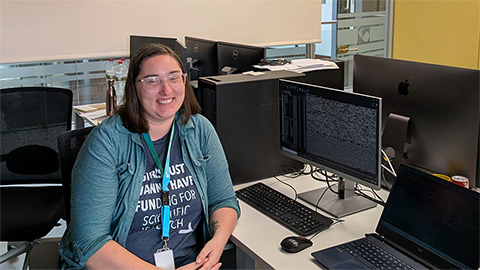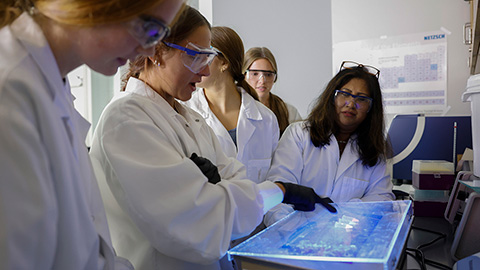Transitioning away from a career at the bench
I came home from work one evening in late 2018 with the words of my supervisor ringing in my ears: “I am disappointed that scientific research is not your long-term interest.”
Into the second year of my postdoctoral training, I was neck-deep in my research projects and volunteering as a writer for my institute’s magazines on the side. My supervisor didn’t like the second part. That evening was the first time I’d talked to him about transitioning into science writing.
I felt angry with myself for not having a good enough explanation. I felt guilty thinking of the resources I had used up only to decide that I wasn’t up for long-term research. Most of all, I felt hurt because he made me feel irresponsible about my chosen future career path, which in his view should have been academia. After a few episodes of South Park followed by a good sleep, I woke up feeling glad — I finally saw my career goals clearly the day I decided science writing was my future profession.
Nine years of scientific research taught me many things, primarily resilience. By the second year of my postdoctoral fellowship, I was adept at troubleshooting, devising new experiment plans and pushing feelings of discontent with work under the carpet.
I always enjoyed writing, but I started writing regularly as a breather activity, something that would help me wind down in my time away from the lab. I wrote about scientists and their work, about the latest research on topics far removed from my comfort zone, and about lectures by eminent scientists and clinicians who visited the National Institutes of Health, where I worked. Before I knew it, a whole new world of information and new networks opened up. My life at work was no longer an isolated struggle with an experiment. I was part of editing and science policy groups. I made friends with like-minded trainees. The variety of writing tasks helped me communicate science more easily. I edited manuscripts written by some of my lab members before they sent them to journals. The work was rewarding to me and useful to them, a win-win situation.
I realized that I enjoyed scientific communication more than I enjoyed lab work. As a researcher, I had very little time outside the lab, and I craved that time. I knew it was hard to get a job in academia, but my concern wasn’t about getting hired. It was about not fitting in as a researcher.
It didn’t take much effort to see that if I was unhappy, my performance and quality of life would suffer. It boiled down to a simple question: Does it feel better being an unhappy scientist in a big and renowned institute or a satisfied individual working on something that absorbs me? The choice didn’t hit me until I’d dipped into activities outside scientific research. I took a long time to see that I’d be happier being a science communicator, but I’m glad I was able to see it.
When I told my supervisor and my parents that I intended to move away from academia, they expressed concern about my plans. My parents didn’t have a clear idea about the rigors of a career in academics, and until then I hadn’t been open with them about my dissatisfaction, so they wanted to know why I was leaving academia. Eventually, they supported me wholeheartedly, as they always have done. However, transitioning away from research didn’t fit into my supervisor’s view of an ideal scientific attitude. We are still not on the same page.
As a millennial, I had a pretty career-oriented upbringing. I grew up in a society that emphasized higher education and valued a handful of professions, scientist being high up in the pecking order. After years of being in a profession I didn’t enjoy wholeheartedly, I felt that my social conditioning had failed me by not letting me explore my career interests at the outset.
In an orientation program with the career counseling office of my institute, a counselor told us that nearly a third of postdoctoral trainees leave academia. The office has a team of experts dedicated to offering guidance, advice and encouragement to transitioning fellows, because these postdocs find little support outside that office.
A friend and fellow science editor at my institute told me that many supervisors believe nonacademic activities outside the lab are a distraction and a waste of time. I know my boss is not alone in his misgivings; they are fairly common in the academic world of mentor-mentee relationships. As more people transition away from academia, trainee-oriented offices like the career counseling unit I mentioned are working to get senior scientists to acknowledge and be supportive of such moves.
I can safely say that I have had a very rewarding scientific career in terms of the work I did in clinical and basic neuroscience. If not for my joy in scientific findings, I never would have realized my greater passion to communicate that feeling with the world.
Enjoy reading ASBMB Today?
Become a member to receive the print edition four times a year and the digital edition monthly.
Learn moreFeatured jobs
from the ASBMB career center
Get the latest from ASBMB Today
Enter your email address, and we’ll send you a weekly email with recent articles, interviews and more.
Latest in Opinions
Opinions highlights or most popular articles

Making my spicy brain work for me
Researcher Reid Blanchett reflects on her journey navigating mental health struggles through graduate school. She found a new path in bioinformatics, proving that science can be flexible, forgiving and full of second chances.

The tortoise wins: How slowing down saved my Ph.D.
Graduate student Amy Bounds reflects on how slowing down in the lab not only improved her relationship with work but also made her a more productive scientist.

How pediatric cataracts shaped my scientific journey
Undergraduate student Grace Jones shares how she transformed her childhood cataract diagnosis into a scientific purpose. She explores how biochemistry can bring a clearer vision to others, and how personal history can shape discovery.

Debugging my code and teaching with ChatGPT
AI tools like ChatGPT have changed the way an assistant professor teaches and does research. But, he asserts that real growth still comes from struggle, and educators must help students use AI wisely — as scaffolds, not shortcuts.

AI in the lab: The power of smarter questions
An assistant professor discusses AI's evolution from a buzzword to a trusted research partner. It helps streamline reviews, troubleshoot code, save time and spark ideas, but its success relies on combining AI with expertise and critical thinking.

How AlphaFold transformed my classroom into a research lab
A high school science teacher reflects on how AI-integrated technologies help her students ponder realistic research questions with hands-on learning.

